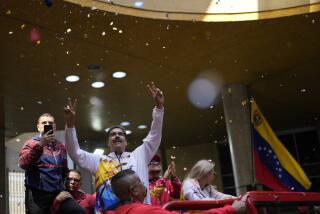Venezuela death toll reaches 11 as protests continue
CARACAS, Venezuela — Opponents and supporters of President Nicolas Maduro held massive demonstrations Saturday in central Caracas and other Venezuelan cities as the unofficial death toll rose to 11 in more than a week of unrest.
Leading the opposition demonstration in eastern Caracas was Liliana Tintori, wife of Leopoldo Lopez, the former Caracas borough mayor who was arrested this week and charged with inciting violence that has erupted during protests.
Lopez and other opposition leaders say armed pro-government vigilantes have been responsible for the deaths and that the opposition has demonstrated peacefully to protest rising crime and shortages. Speaking at a rally attended by tens of thousands of mostly white-shirted opposition members, Tintori said her husband has been jailed unjustly.
“No one can tell me this is not a dictatorship. This is a dictatorship,” said Tintori who shared the platform with opposition leaders Maria Corina Machado and former presidential candidate Henrique Capriles. “No one can tell me we are divided. We are united. Leopoldo will do what is necessary so that Venezuelans unite in peace, and can walk the streets in safety.”
Lopez is being held in Ramo Verde military prison in suburban Caracas and sends messages to supporters urging continued demonstrations. In an interview with El Tiempo newspaper of Bogota, Colombia, Tintori said government officials had urged Lopez to go into exile rather than give himself up for arrest, an offer he declined.
In a surprise announcement at a late night news conference Friday, Maduro called on President Obama to enter into negotiations with Venezuelan officials to settle differences between the two countries. He also rescinded a previous order expelling CNN news crews from Venezuela.
Speaking to supporters Saturday, Maduro said U.S. Secretary of State John F. Kerry has been “insolent” in his comments on Venezuela. Kerry on Friday assailed Venezuela’s “unacceptable” use of force against the opposition. But Maduro reiterated his offer to open discussions with an exchange of ambassadors for the first time since 2010.
Protesters on Saturday demanded that Maduro disarm groups of motorcycle-riding vigilante groups that the opposition says are responsible for the killings. Before his death last March, Maduro’s predecessor, President Hugo Chavez, admitted distributing firearms to paramilitary militias to safeguard his Bolivarean Revolution.
Tens of thousands of marchers, mostly dressed in white to symbolize nonviolence, filled the streets of Marquez barrio of eastern Caracas. Because anti-riot police blocked off several roadways in the area, leaders called for antigovernment demonstrators to merely gather, not march, at designated areas of Caracas and other cities across Venezuela.
The most recent victim was Geraldine Moreno, 23, a university student. She died Saturday after being shot in the head with rubber bullets by a National Guard unit in her home town of Valencia.
Meanwhile, thousands of female supporters of Maduro, mostly dressed in red caps and shirts, gathered in Morelos Plaza in central Caracas to march to the Miraflores presidential palace in a show of support for the government.
Rising violence was reported Friday in western Tachira state, where Maduro called out extra forces in armored vehicles to quell the disturbances. Oil and mining minister Rafael Ramirez threatened Friday to withhold supplies of gasoline in areas of protest unless government opponents ceased their demonstrations.
Also on Friday night, the sound of protesters clanging on pots and pans could be heard throughout much of the city in mass cacerolazo as the form of protest is known in Spanish.
Late Friday, Atty. Gen. Luisa Ortega Diaz said that among the dead, four were killed in Caracas and the rest in other states. Hundreds attended the funeral on Friday of one of the victims, former beauty queen Genesis Carmona, 23, who died of a gunshot wound to the head days after an antigovernment march in Valencia, in central Venezuela.
The National Committee of Academies, a group of scholarly associations representing law, medicine, arts and sciences faculties, issued a joint communique criticizing the government for stifling dissent and permitting armed groups to harm protesters demonstrating peacefully.
Special correspondent Mogollon reported from Caracas and special correspondent Kraul reported from Manzanillo, Mexico.
More to Read
Start your day right
Sign up for Essential California for news, features and recommendations from the L.A. Times and beyond in your inbox six days a week.
You may occasionally receive promotional content from the Los Angeles Times.






